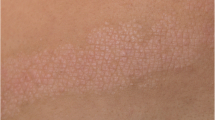Abstract
Carney complex is a familial lentiginosis syndrome; these disorders cover a wide phenotypic spectrum ranging from a benign inherited predisposition to develop cutaneous spots not associated with systemic disease to associations with several syndromes. Carney complex is caused by PRKAR1A mutations and perturbations of the cyclic AMP-dependent protein kinase (PKA) signaling pathway. In addition to the cutaneous findings, the main tumors associated with Carney complex are endocrine: 1) primary pigmented nodular adrenocortical disease, a bilateral adrenal hyperplasia leading to Cushing syndrome; 2) growth-hormone secreting pituitary adenoma or pituitary somatotropic hyperplasia leading to acromegaly; 3) thyroid and gonadal tumors, including a predisposition to thyroid cancer. Other tumors associated with Carney complex include: 1) myxomas of the heart, breast and other sites; 2) psamommatous melanotic schwannomas which can become malignant; 4) a predisposition to a variety of cancers.


Similar content being viewed by others
References
Rosenzweig JL, Lawrence DA, Vogel DL, Costa J, Gorden P. Adrenocorticotropin-independent hypercortisolemia and testicular tumors in a patient with a pituitary tumor and gigantism. J Clin Endocrinol Metab. 1982;55:421–7.
Bauer AJ, Stratakis CA. The lentiginoses: cutaneous markers of systemic disease and a window to new aspects of tumourigenesis. J Med Genet. 2005;42:801–10.
Rhodes AR. Benign neoplasias and hyperplasias of melanocytes. and dysplastic melanocytic nevi. In: Dermatology in general medicine. Freedberg IM, Eisen AZ, Wolff K, et al. (eds.) Fifth edition, New York: McGraw-Hill, Inc., 1999, pp. 1018–1059; 1060-1079.
Stergiopoulos SG, Stratakis CA. Human tumors associated with Carney complex and germline PRKAR1A mutations: a protein kinase a disease ! FEBS Lett. 2003;546:59–64.
Bossis I, Voutetakis A, Bei T, Sandrini F, Griffin KJ, Stratakis CA. Protein kinase a and its role in human neoplasia: the carney complex paradigm. Endocrine-Related Cancer. 2004;11:265–80.
Stratakis CA, Kirschner LS, Carney JA. Clinical and molecular features of the carney complex: diagnostic criteria and recommendations for patient evaluation. J Clin Endocrinol Metab. 2001;86:4041–6.
Bourdeau I, Lacroix A, Schurch W, Caron P, Antakly T, Stratakis CA. Primary pigmented nodular adrenocortical disease: paradoxical responses of cortisol secretion to dexamethasone occur in vitro and are associated with increased expression of the glucocorticoid receptor. J Clin Endocrinol Metab. 2003;88:3931–7.
Carney JA, Stratakis CA. Epitheliod blue nevus and psammomatous melanotic schwannoma: the unusual pigmented skin tumors of the carney complex. Sem Diag Path. 1998;15:216–24.
Stratakis CA, Papageorgiou T, Premkumar A, Pack S, Kirschner LS, Taymans S, Zhuang Z, Oelkers WH, Carney JA. Ovarian lesions in carney complex: clinical genetics and possible predisposition to malignancy. J Clin Endocrinol Metab. 2000;85:4359–66.
Stratakis CA, Papageorgiou T. Ovarian tumors associated with multiple endocrine neoplasias and related syndromes (Carney complex, Peutz-Jeghers syndrome, von Hippel-Lindau disease, Cowden’s disease). Int J Gynecol Cancer. 2002;12:337–47.
Stratakis CA, Courcoutsakis NA, Abati A, Filie A, Doppman JL, Carney JA, Shawker T. Thyroid gland abnormalities in patients with the syndrome of spotty skin pigmentation, myxomas, endocrine overactivity and schwannomas (carney complex). J Clin Endocrinol Metab. 1997;82:2037–43.
Sandrini F, Matyakhina L, Sarlis NJ, Kirschner LS, Farmakidis C, Gimm O, Stratakis CA. Regulatory subunit type 1-a of protein kinase a (PRKAR1A): a tumor suppressor gene for sporadic thyroid cancer. Genes Chromosom Cancer. 2002;35:182–92.
Stratakis CA, Carney JA, Lin JP, Papanicolaou DA, Karl M, Kastner DL, Pras E, Chrousos GP. Carney complex, a familial multiple neoplasia and lentiginoses syndrome. Analysis of 11 kindreds and linkage to the short arm of chromosome 2. J Clin Invest. 1996;97:699–705.
Kirschner LS, Carney JA, Pack SD, Taymans SE, Giatzakis C, Cho YS, Cho-Chung YS, Stratakis CA. Mutations of the gene encoding the protein kinase a type I-A regulatory subunit in patients with the carney complex. Nat Genet. 2000;26:89–92.
Bossis I, Stratakis CA. PRKAR1A: normal and abnormal functions. Endocrinology. 2004;145:5452–8.
Robinson-White A, Hundley TR, Shiferaw M, Bertherat J, Sandrini F, Stratakis CA. Protein kinase a activity in PRKAR1A-mutant cells and regulation of mitogen-activated protein kinases ERK1/2. Hum Mol Genet. 2003;12:1475–84.
Tsilou ET, Chan CC, Sandrini F, Rubin BI, Shen de F, Carney JA, Kaiser-Kupfer M, Stratakis CA. Eyelid myxoma in carney complex without PRKAR1A allelic loss. Am J Med Genet. 2004;130A:395–7.
Kirschner LS, Kusewitt DF, Matyakhina L, Towns 2nd WH, Carney JA, Westphal H, Stratakis CA. A mouse model for the Carney complex tumor syndrome develops neoplasia in cyclic AMP-responsive tissues. Cancer Res. 2005;65:4506–14.
Griffin KJ, Kirschner LS, Matyakhina L, Stergiopoulos S, Robinson-White A, Lenherr S, Weinberg FD, Claflin E, Meoli E, Cho-Chung YS, Stratakis CA. Down-regulation of regulatory subunit type 1A of protein kinase a leads to endocrine and other tumors. Cancer Res. 2004;64:8811–5.
Griffin KJ, Kirschner LS, Matyakhina L, Stergiopoulos S, Robinson-White A, Lenherr S, Weinberg F, Claflin E, Batista D, Bourdeau I, Voutetakis A, Sandrini F, Meoli E, Bauer A, Cho-Chung YS, Bornstein SR, Carney JA, Stratakis CA. A transgenic mouse bearing an antisense construct of regulatory subunit type 1A of protein kinase a develops endocrine and other tumors: comparison to carney complex and other PRKAR1A-induced lesions. J Med Genet. 2004;41:923–31.
Koch CA, Bornstein SR, Chrousos GP, Stratakis CA. Primary pigmented nodular adrenocortical dysplasia (PPNAD) within the scope of Carney complex as the etiology of Cushing syndrome. Med Klin (Munich). 2000;95(4):224–30. German
Watson JC, Stratakis CA, Bryant-Greenwood PK, Koch CA, Kirschner LS, Nguyen T, Carney JA, Oldfield EH. Neurosurgical implications of Carney complex. J Neurosurg. 2000;92(3):413–8.
Acknowledgements
This work was supported by the Intramural Research Program NICHD, NIH.
Author information
Authors and Affiliations
Corresponding author
Ethics declarations
Conflict of interest
The author declares that he has no conflict of interest.
Rights and permissions
About this article
Cite this article
Stratakis, C.A. Carney complex: A familial lentiginosis predisposing to a variety of tumors. Rev Endocr Metab Disord 17, 367–371 (2016). https://doi.org/10.1007/s11154-016-9400-1
Published:
Issue Date:
DOI: https://doi.org/10.1007/s11154-016-9400-1




